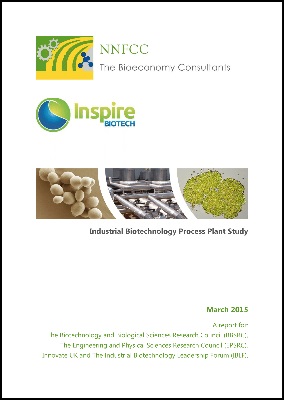 Highlights
Highlights
- Priority industrial biotechnology sectors
- UK industrial biotechnology pilot plant infrastructure
- Gaps in the industrial biotechnology pilot plant in infrastructure
Reasons to read
- Inform collaboration decisions for industrial biotechnology process scale up
- Guide decisions on industrial biotechnology equipment investment
- Understand available UK facilities for industrial biotechnology process scale up
Number of pages: 103
Accessibility: This item is free to download
Summary
Since the publication of the Government initiated Innovation and Growth Team report on Industrial Biotechnology (IB), UK stakeholders have been working to realise the commercial benefits of IB, building on the acknowledged strength of the UK research base.
As access to pilot-scale equipment is commonly cited as a barrier to development of IB processes, NNFCC and Inspire Biotech were commissioned by BBSRC, EPSRC, Innovate UK, and IBLF to identify whether there is a specific need for investment in pilot scale equipment in the UK and to develop the outline case for any investment.
The study described in this report found that overall the UK is currently well served with respect to accessible pilot equipment and competence and is competitive with other European member states. However, a number of emerging technologies were identified as areas worthy of investment and that further more limited investment, focused on specific established sectors, would strengthen UK capability.
Taking account of existing UK capabilities, the developed investment cases look to add to national capability or to expand or consolidate it where it already exists. The cases fall into three broad categories:
A) where there is a need for significant investment to effectively build new capabilities;
B) where there is a need for more limited investment to address gaps in capability in established areas, and
C) other areas where there is little or no need for investment in equipment beyond that provided by existing funding mechanisms.
Investment in major UK opportunities to build excellence and leadership
A) Significant investment areas
There are two strategic areas, C1 gas fermentation and high value products from microalgae, where investment could have a major impact at a national and international level and where early public support could deliver potentially large benefits to the knowledge base and to the UK bioeconomy.
- C1 gas fermentation
- Microalgae for high value products
B) Investment in sector consolidation and growth
Fermentation from cellulosic feedstocks and high value extractives were identified as two areas where UK capability at the academic and institutional level should be improved and/or where the narrow focus of assets and capability are limiting the commercial applicability
C) Other strategic areas of investment
These are represented by the IB areas; biologics, anaerobic digestion and biocatalysis. In these cases availability of, and gaining access to pilot-scale equipment was not seen as a barrier to development. Further development of process efficiency could be catered for by existing R&D funding mechanisms. However, there may be a need for co-ordinating actions to promote industry interactions which existing initiatives such as the BBSRC NIBB’s would be best placed to assess and co-ordinate.
Other Key Findings
During the process of engagement with stakeholders, it quickly became clear that there are a number of additional issues that need to be taken into account when considering capital investment programmes. These broader considerations included:
Supporting and retaining expertise and competence: staff competence and expertise in supporting process scale-up takes significant time to build – generally through ‘learning by doing’. During the study it became evident that there are concerns about wider skills retention and development in IB scale up, that are seen to be as important to sector development as investment in equipment. This knowledge is at risk of loss or dilution where staff retention can be dependent on securing individual contracts or start-up funding and organisations need to develop approaches to address this challenge. This could undermine any investment in new scale-up equipment without ongoing support to retain the staff competence and capability to use it effectively. While this was not a focus for this study, it is highlighted as an issue that requires as much attention as investment in equipment and warrants further examination of how skills retention in the IB scale-up sector could be assisted.
Integrated capabilities: this is the favoured model, where complementary assets (or complete process chains) could be deployed or integrated in a co-ordinated fashion. This extends from the desire to integrate technology to include integration of disciplines and capabilities (e.g. biology, chemistry, engineering, modelling, analytical, etc.).
Process and economic modelling: there is a need to access flexible process and economic models to characterise and optimise early stage processes to deliver a robust set of economics to assess the business case for commercial development at the earliest possible development phase.
Analytical capabilities: access to good analysis skills, services and equipment to monitor and process efficiency.
Constraints imposed by some funding mechanisms: whilst regional or other funding mechanisms have been helpful in establishing pilot facilities, in certain cases it can also become a barrier preventing fully open access e.g. by restricting use to, or prioritising use by companies in the funding region.
While addressing the above issues in detail is beyond the remit of this study, account is taken of these issues where appropriate.
You may also be interested in:
Talk to the experts
For business solutions call NNFCC on +44 (0)1904 435 182 or email
enquiries@nnfcc.co.uk